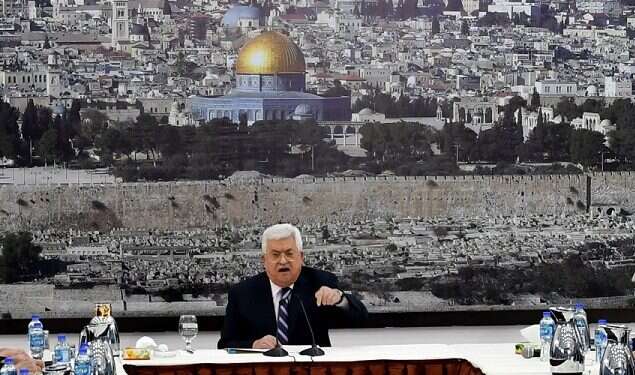Palestinian Authority President Mahmoud Abbas on Monday called the U.S. ambassador to Israel a "son of a dog" because of his support for settlers in the West Bank. The slur drew rebukes from the diplomat and from Prime Minister Benjamin Netanyahu.
Speaking at a Palestinian leadership gathering, Abbas also blamed Hamas for a bomb attack on the convoy of Palestinian Authority Prime Minister Rami Hamdallah in the Gaza Strip last week. His remarks threatened reconciliation efforts with the Islamist group that rules Gaza.
Abbas accused U.S. Ambassador to Israel David Friedman of defending settlers by saying that they were building on "their land."
In an angry tone, Abbas said: "The son of a dog says they build on their land? He is a settler, and his family are settlers, and he is the U.S. ambassador in Tel Aviv. What should we expect from him?"
Friedman, a strong supporter of the settlement enterprise, was an early and enthusiastic advocate of U.S. President Donald Trump's Dec. 6 decision to recognize Jerusalem as Israel's capital and to move the U.S. Embassy there.
Friedman responded to Abbas' insult during a speech at a conference in Jerusalem on combating global anti-Semitism, saying: "His response was to refer to me as a son of a dog. Anti-Semitism or political discourse? Not for me to judge, I leave that all up to you."
In Washington, U.S. State Department spokeswoman Heather Nauert said, "President Abbas's comments were outrageous and unhelpful. We urge the Palestinian Authority to focus its efforts on improving the lives of the Palestinian people and advancing the cause of peace."
U.S. Middle East envoy Jason Greenblatt issued a statement calling Abbas' comment "highly inappropriate."
"The time has come for President Abbas to choose between hateful rhetoric and concrete and practical efforts to improve the quality of life of his people and lead them to peace and prosperity. Notwithstanding his highly inappropriate insults against members of the Trump administration, the latest iteration being his insult of my good friend and colleague Ambassador Friedman, we are committed to the Palestinian people and to the changes that must be implemented for peaceful coexistence. We are finalizing our plan for peace and we will advance it when circumstances are right," Greenblatt wrote on Twitter.
Netanyahu said Trump's decisions on Jerusalem appear to have brought Abbas to the point of making a verbal attack on a U.S. official.
"For the first time in decades, the U.S. administration has stopped spoiling the Palestinian leaders and tells them enough is enough," Netanyahu said on Twitter. "Apparently the shock of the truth has caused them to lose it."
Addressing the rancor between Hamas and his Fatah party, Abbas said there had been "zero" progress in reconciliation, despite efforts to introduce a power-sharing deal in crossings out of the Gaza Strip and in security within the enclave.
Relations have worsened further since when the convoy in which Hamdallah and Palestinian security chief Majid Faraj were traveling in Gaza was attacked with a roadside bomb on March 13. They escaped uninjured.
"We congratulate the two big brothers [Hamdallah and Faraj] that they are safe after the sinful and despicable attack that was carried out against them by the Hamas movement in the Gaza Strip," Abbas said.
Hamas has denied involvement in the bombing and has said it is investigating the incident.
Abbas offered no evidence of Hamas' involvement but said he did not trust Hamas to investigate the incident honestly.
"We do not want investigation from them, we do not want information from them, and we do not want anything from them because we know exactly that they, the Hamas movement, were the ones who committed this incident," Abbas said.
Abbas said Hamas would have to give up control of the Gaza Strip or risk taking full responsibility for the enclave and its 2 million residents without any help from his Western-backed Palestinian Authority.
"In my capacity as the president of the Palestinian people, I have tolerated much in order to regain unity and unite the homeland and I was met with rejection by Hamas and its illegitimate authority," he said.
"As president of the Palestinian people, I've decided to take all national, legal and financial measures." Abbas did not elaborate on what those measures might be. He said his government would either take full responsibility for Gaza or abandon it to Hamas, a step that would in effect end the dream of a Palestinian state in the West Bank and Gaza Strip.
Hamas called Abbas' comments irresponsible and said they aimed to "burn bridges and reinforce divisions."
Fatah and Hamas have tried for years to come to an accommodation over running the Gaza Strip, but have repeatedly failed to implement deals mainly brokered by Egypt.




